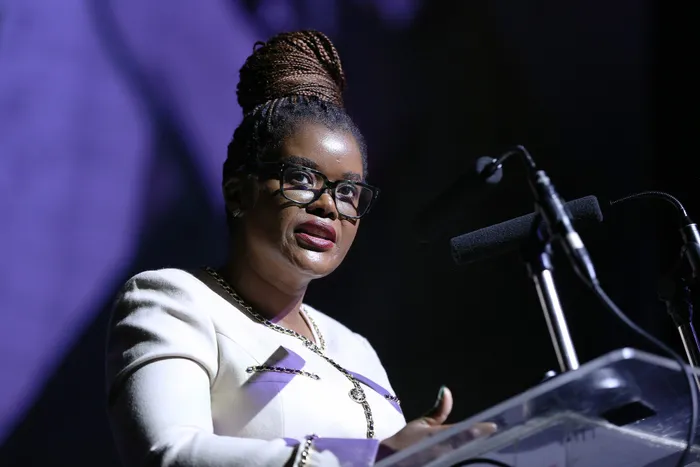How arrogance can lead to a politician's downfall
Opinion

Higher Education Minister Dr Nobuhle Nkabane's recent shocking display of unadulterated arrogance was deeply concerning.
Image: File/Sibonelo Ngcobo/Independent Newspapers
“Politicians are like monkeys in that ‘the higher they climb, the more revolting are the parts they expose’.” — Gwilym Lloyd George, 1st Viscount Tenby
A disturbing display of arrogance
Tebogo Letsi, Chairperson of the Portfolio Committee on Higher Education: “Question: In your own view, Minister, what makes a person credible?”
Dr Nobuhle Nkabane, Minister of Higher Education and Training: “What makes a person credible chair is exactly how it is defined when you goggle… eh… encyclopedia. You will see what it means, exactly that.”
Chairperson of the Portfolio Committee: “You are not going to answer us, Minister.”
Minister (unashamedly chewing food in her mouth and disdainfully looking to another direction): “I have responded, chairperson.”
“It is an old tale, as old as the conduct of human affairs, which was summed up pretty definitively by Lord Acton well over a century ago: power tends to corrupt, and absolute power corrupts absolutely.”
On arrogance, the French proverb states: “None are more haughty than a commonplace person raised to power.” Charles Haddon Spurgeon similarly noted: “None are more unjust in their judgements of others than those who have a high opinion of themselves.”
The recent shocking display of unadulterated arrogance by the Minister of Higher Education and Training was deeply concerning. Her despicable, shameless, and discourteous conduct — exemplified by chewing food while responding to critical questions during a live televised parliamentary session — reflects her ignorance of how a public figure should carry herself.
Arrogance is the most dangerous leadership flaw. Believing one is infallible or smarter than everyone else inevitably leads to underestimating others or overestimating one’s own knowledge. It is the Achilles heel of those who are smart but think they are more clever than they really are. As Jeff Immelt says, “[T]op leaders cannot allow weak spots to be blind spots.”
Arrogance often manifests as disparaging and objectionable behaviours targeted at others, ranging from aloofness and not listening to more serious actions like dismissing, deceiving, belittling, and hostility. According to Johnson et al’s study, “Acting superior but actually inferior? Correlates and consequences of workplace arrogance,” arrogant behaviours may be performed as a façade to mask incompetence.
Nkabane may be an effective politician, but lacks the gravitas of a true leader. This is what happens when people are rushed into positions they’re not ready for. Speed in rushing things in politics kills.
The ANC’s conspicuous silence regarding the minister’s egregious behaviour is both shocking and concerning. The ANC should have reined in Nkabane and instructed her to apologise to the nation. Failure to publicly restrain her will have serious political ramifications.
I won’t call for the minister's sacking. I believe in giving people second chances because no politician is immune to the arrogance of power. As the saying goes: “Good judgement comes from experience, and experience comes from bad judgement.”
The failure of both the minister and her senior officials to answer straightforward questions indicates deeper problems within the department. The minister’s supercilious behaviour has created a “perfect storm” troubling our democracy.
Gifted leaders are frequently endowed with self-importance and a sense of imperious assurance. American organisational and management psychologist Hodges L Golson suggests a four-quadrant approach with brainpower on one axis and arrogance on the other:
- Low competence and low arrogance: Unlikely to rise to high ranks
- High competence and low arrogance: Solve problems without being offensive
- Low competence and high arrogance: Dangerous because they don't realise their limitations
- High competence and high arrogance: Interesting because of competing forces of "great potential and great danger"
These leaders “win any individual battle but often lose the war” due to their destructive impact on morale and relationships.
What Nkabane clearly lacks is intellectual humility — a quality essential for effective leadership. Intellectual humility involves:
- Awareness of one’s limitations and biases
- Willingness to revise views based on evidence
- Open-mindedness and curiosity
- Realism about one's flaws and capabilities
- Teachability and adaptability
In political contexts, intellectually humble individuals demonstrate greater openness to opposing views, investigate misinformation more thoroughly, and endorse more moderate positions overall.
There is no formula for becoming humble — not for individuals, and not for nations. Benjamin Franklin grappled with how to achieve both greatness and humility simultaneously.
Dr David J Bobb asserts: “The power promised by humility is power over oneself, in self-government. Humility's strength is obscured by the age of arrogance in which we live.”
When a politician gets infected with arrogance, the end of their political career waits around the corner. Our challenge today is to rediscover and reawaken humility before it's too late — not just as individuals, but as a nation committed to democratic values and good governance.
* Dr Vusi Shongwe works in the Department of Sport, Arts, and Culture in KwaZulu-Natal and writes in his personal capacity.
** The views expressed here do not reflect those of the Sunday Independent, Independent Media or IOL.
